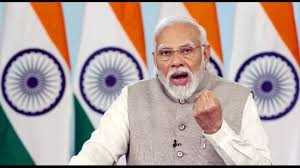
On June 6, Prime Minister Narendra Modi will inaugurate key infrastructure projects worth ₹46,000 crore in Jammu and Kashmir, marking a watershed moment in our developmental journey following the abrogation of Article 370. At the heart of these is the long-awaited Udhampur-Srinagar-Baramulla Rail Link (USBRL), a project not merely of engineering triumph but of national integration, emotional connect, and strategic transformation. For decades, the people of Kashmir have waited to be fully linked—physically and symbolically—to the rest of the country. With this rail line, that long-standing aspiration takes tangible form. The USBRL project, which has been under construction for nearly two decades, spans some of the most challenging terrains in the Himalayas. But it is not just about steel tracks and tunnels cutting through the Pir Panjal range—it’s about weaving a fabric of trust, mobility, opportunity, and belonging. The completion of this rail link fulfills a key promise made by Prime Minister Modi to ensure that Jammu and Kashmir is not left behind in India’s developmental march. Since the abrogation of Article 370 in 2019, the Centre has spoken repeatedly about integrating Jammu and Kashmir into the national mainstream—not only through administrative measures, but by making the region a stakeholder in India’s growth story. The USBRL is perhaps the most vivid manifestation of this intent. It connects far-flung regions like Baramulla and Srinagar with Udhampur and the rest of India’s railway network, effectively bridging the psychological and logistical gap that existed for far too long. Modi’s emphasis on infrastructure as the foundation of national unity is well understood, and Jammu and Kashmir has been central to this vision. From new highways and tunnels to power and telecom expansion, a pattern is emerging—one where connectivity is the first step toward stability, prosperity, and empowerment. The USBRL, by reducing travel time, improving logistics, and boosting tourism and trade, is poised to change the economic landscape of the valley. More importantly, it brings with it a message: that Kashmir is not peripheral, but pivotal to India’s growth. Some critics may view this move through a political lens, but even they must acknowledge that better connectivity brings better changes which shapes better lives. The USBRL is more than a railway line—it is a statement of faith in the people of Jammu and Kashmir and a reaffirmation of Modi’s long-standing pledge to heal, develop, and integrate. As the first trains roll into Srinagar, they carry not just passengers, but the promise of a more united and inclusive India.
On June 6, Prime Minister Narendra Modi will inaugurate key infrastructure projects worth ₹46,000 crore in Jammu and Kashmir, marking a watershed moment in our developmental journey following the abrogation of Article 370. At the heart of these is the long-awaited Udhampur-Srinagar-Baramulla Rail Link (USBRL), a project not merely of engineering triumph but of national integration, emotional connect, and strategic transformation. For decades, the people of Kashmir have waited to be fully linked—physically and symbolically—to the rest of the country. With this rail line, that long-standing aspiration takes tangible form. The USBRL project, which has been under construction for nearly two decades, spans some of the most challenging terrains in the Himalayas. But it is not just about steel tracks and tunnels cutting through the Pir Panjal range—it’s about weaving a fabric of trust, mobility, opportunity, and belonging. The completion of this rail link fulfills a key promise made by Prime Minister Modi to ensure that Jammu and Kashmir is not left behind in India’s developmental march. Since the abrogation of Article 370 in 2019, the Centre has spoken repeatedly about integrating Jammu and Kashmir into the national mainstream—not only through administrative measures, but by making the region a stakeholder in India’s growth story. The USBRL is perhaps the most vivid manifestation of this intent. It connects far-flung regions like Baramulla and Srinagar with Udhampur and the rest of India’s railway network, effectively bridging the psychological and logistical gap that existed for far too long. Modi’s emphasis on infrastructure as the foundation of national unity is well understood, and Jammu and Kashmir has been central to this vision. From new highways and tunnels to power and telecom expansion, a pattern is emerging—one where connectivity is the first step toward stability, prosperity, and empowerment. The USBRL, by reducing travel time, improving logistics, and boosting tourism and trade, is poised to change the economic landscape of the valley. More importantly, it brings with it a message: that Kashmir is not peripheral, but pivotal to India’s growth. Some critics may view this move through a political lens, but even they must acknowledge that better connectivity brings better changes which shapes better lives. The USBRL is more than a railway line—it is a statement of faith in the people of Jammu and Kashmir and a reaffirmation of Modi’s long-standing pledge to heal, develop, and integrate. As the first trains roll into Srinagar, they carry not just passengers, but the promise of a more united and inclusive India.
© Copyright 2023 brighterkashmir.com All Rights Reserved. Quantum Technologies